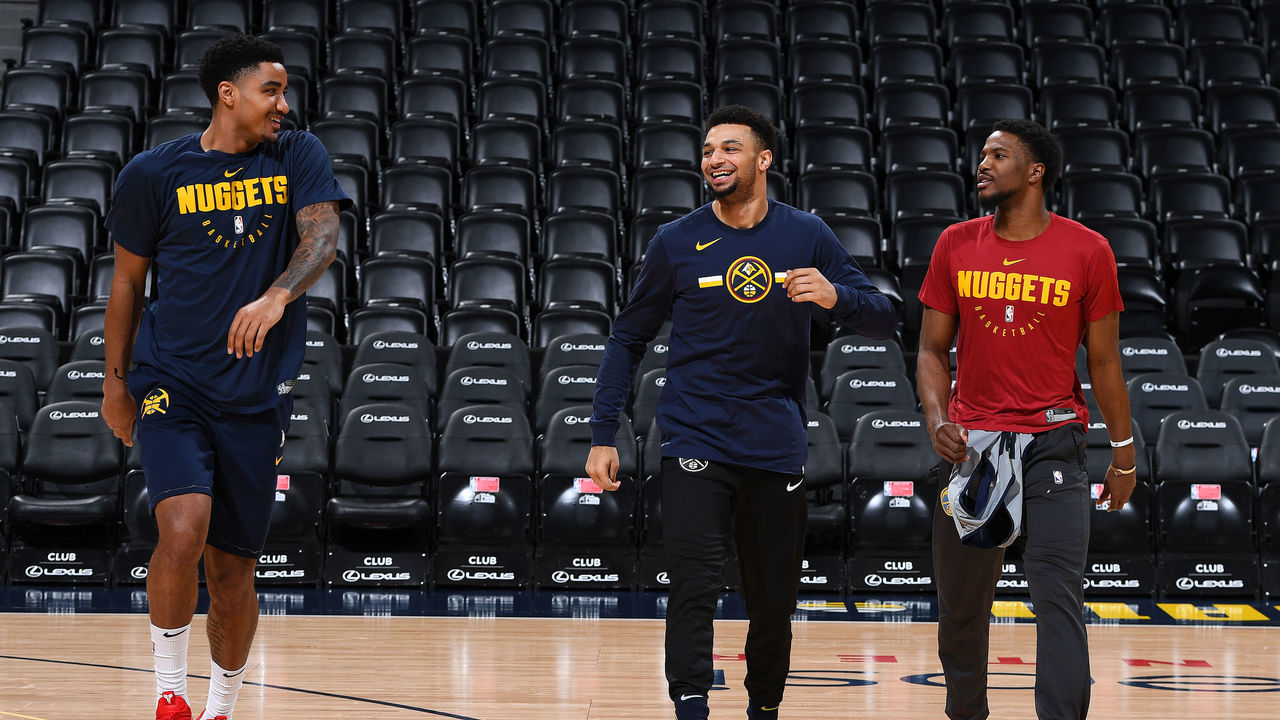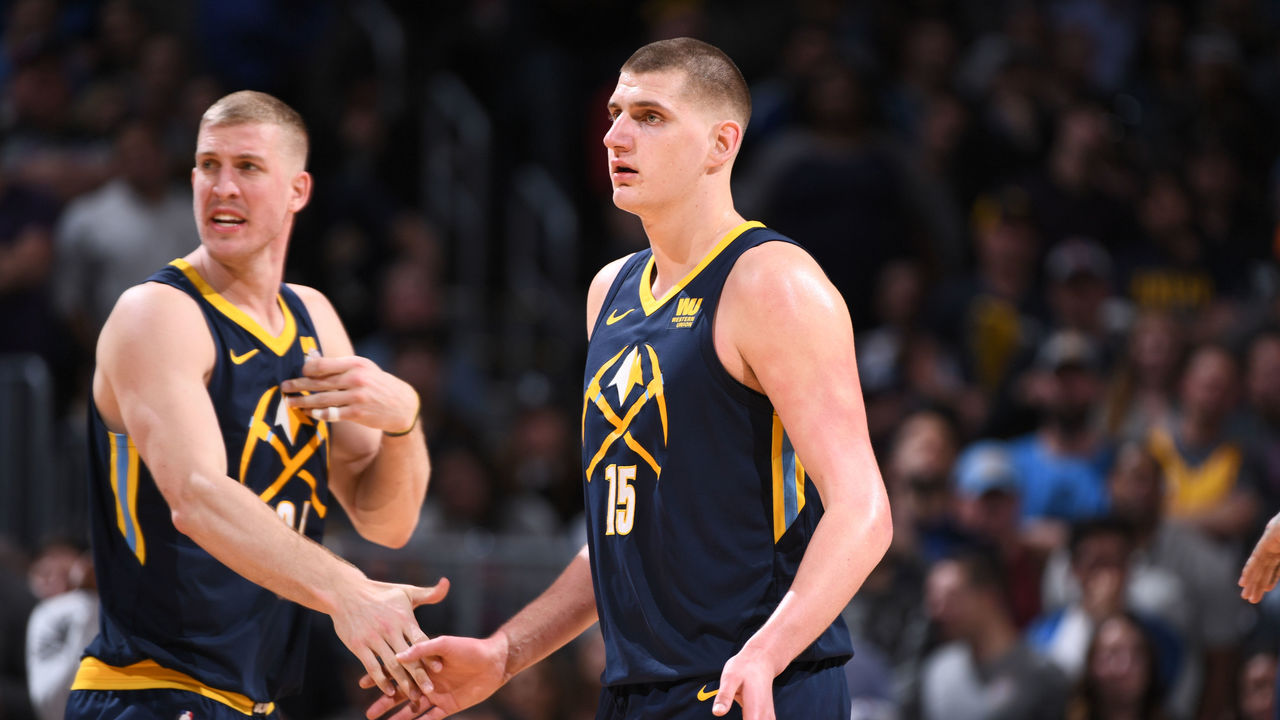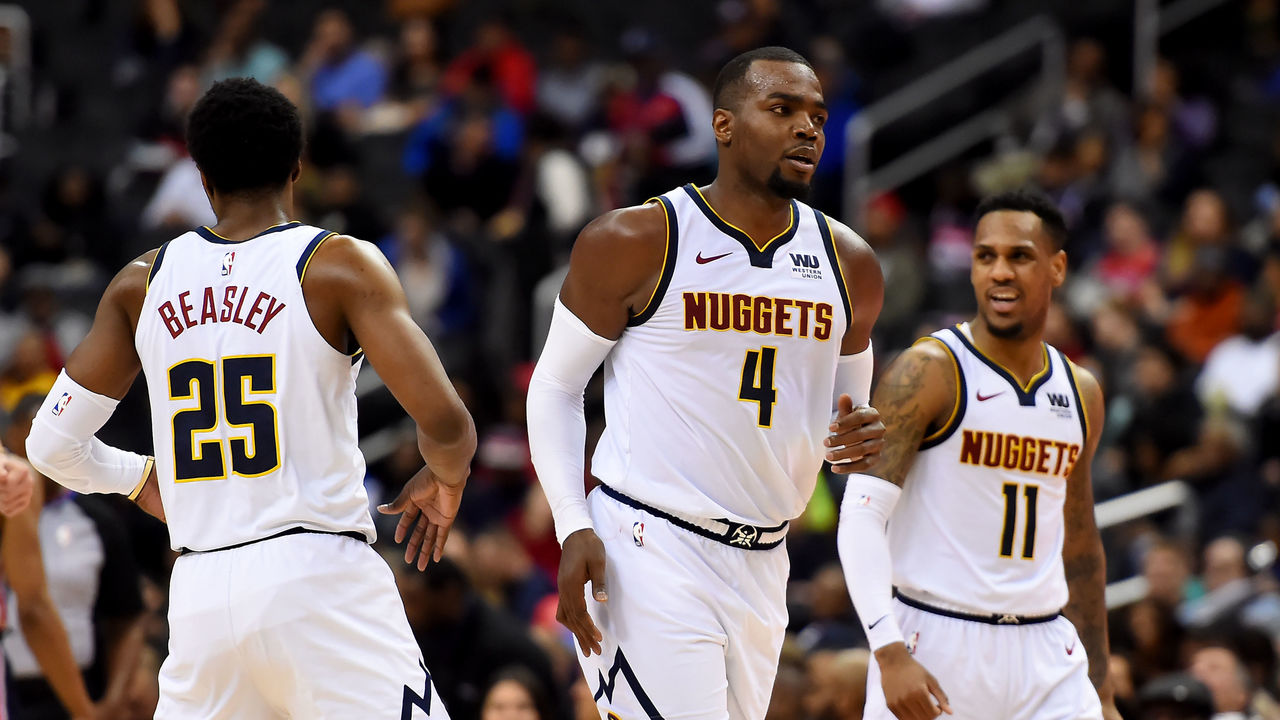Why the Nuggets deserve your respect - and your doubts
It is a truth universally acknowledged that playoff basketball is a different animal than the regular-season variety.
The platitudes about how the game changes in the spring are well-worn: Defenses tighten up. Whistles are swallowed. Pace slows, play gets more physical, rotations shrink, and game plans get more exaggerated because of extensive scouting. One-on-one scoring becomes more valuable. And of course, it takes increased physical and mental fortitude to perform with such elevated stakes.
Some of those distinctions are more legitimate than others, but they've all become bits of accepted NBA wisdom. So, when a team experiences tremendous regular-season success without meeting the established criteria for postseason carryover, a lot of skeptical antennae perk up. And this year's Denver Nuggets feel specifically engineered to be a test case for the regular-season/playoff divide. They're young, lack postseason experience, have only one star, run an unconventional and egalitarian offense, rely more on depth than elite talent, and have a glaring defensive question mark at the heart of their roster.
"When you talk to teams in the West, they don't fear the Nuggets," ESPN's Brian Windhorst said recently. "Everyone wants a shot at the Nuggets."
But despite all the aforementioned attributes, such brazen unconcern seems like an overcorrection. The 49-23 Nuggets have played like a top-two Western Conference team basically all season and sit just a half-game behind the Golden State Warriors for the No. 1 seed. They rank in the top 10 on both sides of the ball - a magical (arbitrary) benchmark for contention - and have posted the league's fourth-best net rating. They've proven themselves against quality opponents, compiling a 12-9 record against fellow West playoff teams. They've weathered long-term injuries to multiple starters while barely missing a beat. And they own an absurd 30-6 record on their home floor, where they're overwhelmingly likely to open the first two rounds, if not the entirety of the West playoffs.
It's one thing for rival teams to prefer a matchup with the Nuggets when the alternative is seeing the Warriors or Rockets, but it's another for those teams to express a complete lack of fear over the prospect of playing a series on Mile High hardwood. It seems like the Nuggets are being cast as a more vulnerable, beatable foe than they actually are.
Of course, that doesn't mean the questions about Denver's postseason viability don't deserve consideration. Let's take a closer look at the biggest ones.
A matter of trust

Nobody in the Nuggets' rotation - aside from Paul Millsap, Mason Plumlee, and Will Barton (for a grand total of 81 minutes) - has seen the floor in a playoff game. Michael Malone has never coached one. Until we actually see it, we won't know how prepared the team's neophytes are for their first foray onto the big stage.
And even if the experience trope is overplayed and oversimplified, there's more than just anecdotal evidence to suggest it matters a great deal. Ascending teams like these Nuggets typically have to get burned at least once before forging a steely outer shell in the fires of the postseason.
The uncertainty with the Nuggets feels particularly pronounced on the wing, where their options don't just lack playoff experience, but experience, period. In recent years, the most successful postseason teams have featured scads of big, switchable, multi-skilled wings. But so many of the guys Denver's come to rely on in those roles - Malik Beasley, Torrey Craig, Juancho Hernangomez - are unproven.
It doesn't help that Gary Harris hasn't been the same since coming back from his latest injury, without quite the same off-the-bounce verve or the same caliber of pestering defense. Beasley has stepped up wonderfully, but the 22-year-old's sample of meaningful NBA rotation minutes is so small that it's hard to know how much to trust. Craig is probably the team's best wing stopper, but he's also a liability on offense and defenders will help off him aggressively while daring him (and his 12.8 percent usage rate) to score. Barton might be the most reliable option, which isn't a particularly comforting thought.
At least with Millsap, Plumlee, and Nikola Jokic, the Nuggets know what they have in the frontcourt. Meanwhile, Jamal Murray and Monte Morris give them sturdy (if unspectacular) point guard play, with Murray serving as a self-sufficient scoring threat who can carry the offense for stretches and won't get trigger-shy in tense moments.
But at the premium positions, this team has a concerning number of dependability questions.
Masking a (big) defensive liability

This is the first season of Jokic's career in which the Nuggets have managed to craft an above-average defense around him. And when weighed against their bottom-seven marks in Jokic's first three seasons, it's not definitive proof that it can hold up when the pressure mounts.
Every playoff team will have to work around a defensive weakness, but none of them are nearly as dependent on such a slow-footed, earthbound big man. Jokic gives opponents a continual place to attack while putting a strain on his own teammates. Schemes are designed to limit the exposure of a team's most vulnerable defender, and when that player is a center, the defense will usually protect him by dropping him way back in the pick-and-roll, which limits his range and keeps him close to the basket. But since Jokic barely gets off the ground and isn't much of a rim-protector, the Nuggets employ a different brand of protectionism.
Instead, they use Jokic to put pressure on the ball, often with hard hedges or all-out blitzes. They've scaled back the aggressiveness as the season's gone along, but even when they play things more conservatively (which they'll do against teams without a dominant one-on-one scorer), Jokic still frequently moves out 20-plus feet from the basket. That largely prevents him from being marooned on an island on a switch, or from having to track smaller, speedier players in space. The strategy shifts the onus onto quicker weak-side defenders who must scramble to cover for him. Rather than use Jokic's size at the rim, the Nuggets use it to burn shot clock and induce panicked mistakes.
But blitzing the pick-and-roll is dangerous business, especially against seasoned playoff teams. Those opponents will be stocked with shooting and secondary playmaking, so routinely allowing them to play four-on-three may not be a winning formula over the course of a series. It shrinks the margin for error, putting pressure on the rest of the defense to rotate and help on a string. It leaves the Nuggets vulnerable to open 3-pointers off swing sequences, and leaves the rim dangerously unprotected with the big drawn out to the perimeter. Denver allows 3-point attempts at the league's eighth-highest rate, and unlike other top defenses that concede a lot of threes (like Milwaukee and Boston), the lineup doesn't compensate by shutting down the paint.
The Nuggets have tried to mitigate that issue with two-center lineups featuring Jokic and Plumlee, and that look has been shockingly effective. They still give up plenty of threes, but make up for it with stout interior defense, voracious rebounding, and a shockingly low foul rate, producing a sparkling 101.8 defensive rating.
Millsap makes the whole scheme hum with his defensive clairvoyance. He has a knack for making the correct help-side rotation, anticipating where the ball will end up, and arriving there a split-second earlier than the offense expects. Somehow, the Nuggets have made it all work. They own a respectable 107 defensive rating with Jokic on the floor (though they've been a mess when he plays without Millsap or Plumlee), and those lineups have held up against elite scoring teams. In fact, Denver ranks ninth in the league at defending top-10 offenses, according to NBA.com's John Schuhmann. Can the Nuggets keep doing this? The playoff proving ground awaits.
The limits of depth

Depth matters less in the playoffs, and teams that rely on it don't tend to fare well against star-laden opponents that suddenly start using their best players for 40-plus minutes a game. That's not a hard-and-fast rule - the 2014 Spurs say hi - but it's borne out more often than not.
There's no question that Jokic is a legitimate superstar who's been one of the five or six most impactful offensive players in the league this season. Beyond him, though, Denver is devoid of elite talent. Millsap is probably the team's second-best overall player, but at 34, he's no longer much of an offensive threat. Murray is the next-best scorer, but he isn't particularly efficient, with a gallingly low free-throw rate (4.2 per 100 possessions) and just a 52.9 true shooting percentage.
The Nuggets have covered for that secondary-talent deficiency with an outstanding bench. Every player in their rotation has a positive on-court net rating this season, which is crazy. But whether they can translate what they've done against opposing benches to playoff minutes against starters is an open question.
It's also easy to imagine postseason defenses resolutely playing Jokic straight up and daring him to be a scorer. He's gotten more assertive hunting his own offense this season, but he's still most comfortable being a playmaker first.
On that note, Denver is the league's fourth-least efficient team at scoring in isolation. If an opponent is constantly switching screens, staying home, and forcing the Nuggets to play one-on-one, will they have enough juice to score with the best teams in the West?
The upshot
After being eliminated on the final day of the last two regular seasons, the Nuggets clinched their playoff spot with nearly a month to go this year while proving about everything you could ask from a team in their position. At this point, you can focus on the many concerns about their postseason viability, or you can instead marvel at what they've managed to accomplish in spite of them.
The doubts at least relieve Denver of the weight of expectations. They put the team in a rare and forgiving place, as a higher seed that will open its first-round series at home and will still feel like an underdog.
However, every team needs to attain at least some level of playoff success for proof of concept. Even though Denver will be tasting the postseason for the first time in six years, losing in the first round as a top-two seed would qualify as a letdown.
It's possible to appreciate what a team has done while also questioning what it can do from here on out. For the Nuggets, in particular, those two things are not mutually exclusive. They've proven a ton, and yet they still have a ton left to prove. You can respect them and doubt them in the same breath. The answers will come soon enough.